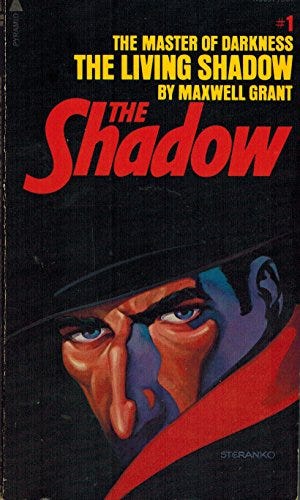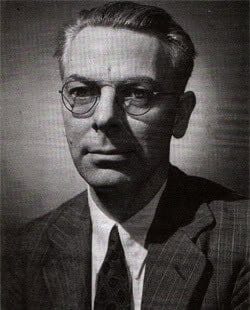A Million Words a Year For Ten Years Straight - Walter B. Gibson
INK & GRIT: Masters of Pulp Fiction
If you’re familiar with the pulps, then you may recognize one of the genre’s most iconic characters that was born from a popular radio program, countless pulp novels, serials, video games, comic books, and films.
Originally conceived as a narrator for the Detective Story Hour radio program, The Shadow later developed into his own character, spawning hundreds of popular novels during the 1930s. Though each novel was published under the name Maxwell Grant, the vast majority of titles (more than 300) where penned by Walter B. Gibson, who originally was hired to develop the character.
At the speed of 10,000 words a day over the course of a decade, Gibson produced a staggering amount of Shadow books and stories that cemented his place among the masters of pulp fiction. Below are a few quotes I've collected from his Writer’s Digest essay published in 1941, A Million Words a Year For Ten Years Straight, where Gibson shares his experience as a prolific pulp writer.
On Ten Years Writing The Shadow
“Ten years ago, Street & Smith had a weekly radio program that dramatized stories from Detective Story Magazine. In the program, they used an announcer who termed himself "The Shadow." His sepulchral catch-phrase, "The Shadow Knows" existed only as a bodiless theme. The Shadow would have remained such, but for the foresight of Henry W. Ralston, now vice-president of Street & Smith Publications. He advised creating a magazine character to be called The Shadow. I was the writer who received the assignment. The story was to be done under the pen name of Maxwell Grant; if satisfactory, three more would be needed since The Shadow was to be a quarterly publication. Since then, I have written more than two hundred Shadow novels, totaling better than ten million words. The first issue clicked, and the magazine immediately became a monthly. It jumped to twice a month, within its second year , and still appears at that frequency.”
On Creating Character
“When I first started writing the Shadow stories I had two things to do; create a character and devise a plot. I treated them as one, and herewith made a chance discovery. It was this: build a lead character, and a story will build itself around him. In a sense, the lead character becomes the plot, or at least the main portion of it.”
This is by no means as obvious as it sounds. It does not mean to construct a character, equip him with a lot of things that will please you, and may catch the reader….If the character is to be the personalization of the plot, he must develop with it.
You must treat the character as a discovery, rather than your own creation. Treat him, not just seriously, but profoundly. Picture him as real, and beyond you, in mind as well as prowess….This mental attitude gives you a deeper knowledge of the character than the story itself discloses.”
Basically, my lead character is in the game of his own amusement, and therefore (parenthetically) the reader’s entertainment.”
On Telling Stories
“I found that I could start a story just from that situation. However, it wasn’t a case of taking any character, and giving him any problem. They must be suitable to that lead character, or —here’s a help —must furnish the impetus to another problem that is very well suited to him.
The system that I fortunately blundered upon enabled me to write the stories “off the cuff” as some writers put it. I brought in lesser characters, with their conflicting traits and motives, and let them reveal The Shadow, but inasmuch as he become more rounded, with each succeeding story, the value of the minor characters necessarily became less.”
On Steady Output
“I believe that other writers think I find steady easy; whereas I know that I find it difficult. Before The Shadow went twice a month, I was asked to begin writing on that basis, to make sure that I could do it. I did the year’s supply in under ten months. Since then, I’ve never had to speed my writing schedule….which brings me to a personal conviction: namely, that many writers who think they’ve approached their output limit, are only kidding themselves.
Output means money. If you don’t write stories, you can’t sell them. So write them until it hurts. Then write more. Maybe you’ll find that pain will help them.”
On Inspiration
“I need just as much [inspiration] as if I were waiting for another, because I’m not writing for any market. I have always written for readers, and have found it valuable to continue that policy. It keeps a writer from going stale, enables him to follow any trend, and sometimes to start one.
It is these personal accounts from the almost forgotten era of the Pulps that continue to inspire me to keep at it, to keep writing. Gibson’s work speaks for itself, a true craftsman of storytelling that helped cement a legendary pulp character in history. I’ll be publishing a book review of The Shadow Compendium edited by Steven Donoso later this month.
More INK & GRIT articles incoming as I continue to read and discover new pulp writers.
Till next time.
“Do I enjoy being a writer? I’d rather do any of a thousand other things.
But whatever job I took, I’d spoil all the fun of by wanting to write.
So there it stands.”
Walter B. Gibson
(1897 - 1985)






Perfect titming, Frank and P3. Watch for tomorrow's TNDJ edition and you'll see what I mean. (grin)
I liked this one a lot. Pulp writers are not readily available in Romania, and I quite like pulp, so getting to read about them from you is valuable.